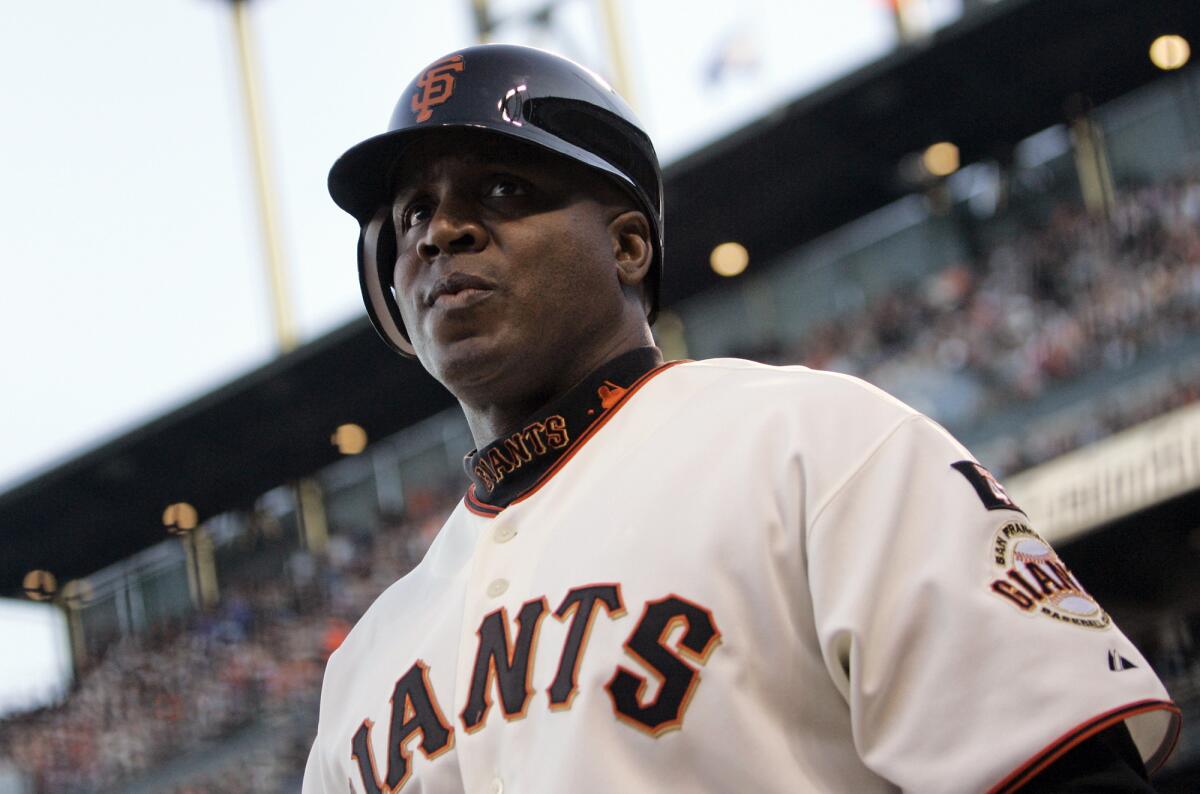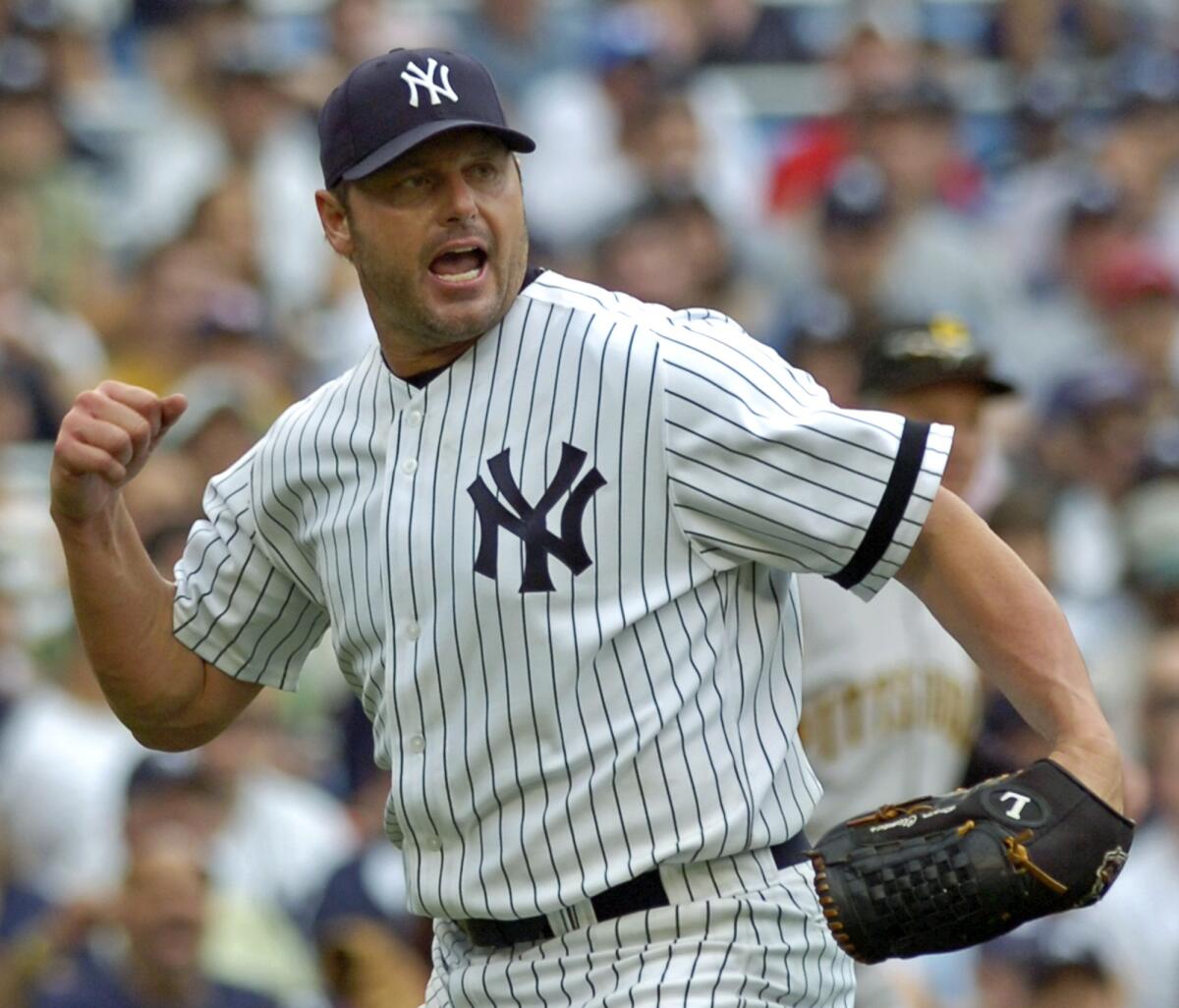Don’t ask the Hall of Fame how to vote on Barry Bonds or Roger Clemens

- Share via
Barry Bonds took his last swing in the major leagues 10 years ago. Roger Clemens threw his final fastball in the major leagues 10 years ago.
The Hall of Fame has had a decade to figure out what to do about Bonds and Clemens. It has done nothing, which is exactly the right thing.
They are two of the most decorated players in baseball history. They are two of the greatest pariahs in baseball history.
Vote for them. Don’t vote for them. But don’t throw up your hands and beg for the Hall of Fame to tell you which way to vote. If you can evaluate the merits of Tim Raines and Trevor Hoffman, expending time, energy and research to come to an independent conclusion, certainly you can do the same for Bonds and Clemens.
The Hall of Fame Class of 2017 will be unveiled Wednesday. Raines and Jeff Bagwell are expected to be elected, based on the votes announced publicly — roughly half the electorate — and compiled by Ryan Thibodaux.
Ivan Rodriguez, Vladimir Guerrero and Hoffman appear to be on the bubble for the required 75%. Bonds and Clemens are projected to top 50% for the first time in their five years on the ballot, up from 35% two years ago and 45% last year.
The results will be accompanied by another chorus of wails about how the Hall of Fame needs to provide the voters — veteran members of the Baseball Writers Assn. of America — with guidance on how to handle the steroid era once and for all.
“I’m open to discussion,” Hall President Jeff Idelson said, “but nobody has ever come back to me with what kind of guidance one would want.”
Indeed, the BBWAA committee formed to make voting recommendations to the Hall has not proposed or requested any such guidance, said committee chair Susan Slusser of the San Francisco Chronicle. (The committee instead asked the Hall to allow votes for as many as 12 players, rather than 10. The Hall’s board of directors has not approved the request.)
“Once you get guidance, you start to get limited in being able to make your own decision,” Idelson said.
Pick a position, defend it, and stick with it. Is it just about statistics? Should players linked to steroids be disqualified? Just the ones who have failed a drug test? Been suspended under baseball’s drug policy? Fingered by George Mitchell, or by Jose Canseco?
Or should a steroid taint be one strike against a candidate, not all three strikes?
Here’s the thing: If the 400-plus writers voting for the Hall do not agree, then neither would a group of hundreds of fans, or former players, or any other voting body one might propose. Why shouldn’t there be various interpretations of the instruction for voters to consider “integrity, sportsmanship, character?”
Oh, and Idelson said the Hall’s board believes the so-called character clause remains important. There has been no consideration to removing it, he said.
“We feel the umbrella is broad enough that it’s about respecting the game and giving the writers the leeway to continue to vote how they feel, because those terms are subjective,” Idelson said. “Different people have different opinions and values about how they weight those terms.”

That is why the surge in votes for Bonds and Clemens this year is so disappointing — not in the result, but in the reason behind it.
Raines and Bagwell have benefited from unofficial campaign managers — that is, an advocate who has championed a candidacy by persuading writers to consider careers in a new and often analytical light.
But no such advocacy is necessary for Bonds and Clemens. Their numbers scream first ballot. No new information has emerged that would sway a writer who believes Bonds and Clemens cheated to believe otherwise.
Bonds and Clemens got a big boost last year, after the Hall purged dozens of older voters from the rolls. The younger generation of baseball writers generally is more tolerant of players linked to steroid use, more reliant on statistics and less on observation and conversation with players, coaches, managers and executives.
This year’s big boost can be traced largely to last month’s election of Bud Selig — by a 16-man committee that included one active writer. The logic: if the man who was in charge during the steroid era is going into the Hall of Fame, then why keep out the best players from that era?
That makes little sense. If you didn’t vote for Bonds and Clemens because you believe they cheated the game and their fellow players, that reasoning is every bit as valid this year as it was last year. To throw up your hands and say Bonds and Clemens should be inducted because Selig is about to be inducted smacks of hiding behind perceived guidance from the Hall.
Idelson said the Hall is prepared to honor any electees — Selig, Bonds, Clemens, whoever. Selig was elected on his own merits, Idelson said. A player should be too.
But should a writer vote for any player simply because Selig was elected?
“Absolutely not,” Idelson said. “Of course not.”
The Times does not let its writers vote. But, lest this column be interpreted as a plea to keep Bonds and Clemens out of Cooperstown, I would vote for both if I could. Bonds was the dominant hitter of his era, Clemens the dominant pitcher. That does not mean every player linked to steroids would get my vote, because Bonds and Clemens dominated those players too. They were the cream of a tainted crop, and of an era that cannot be wished away.
Selig almost certainly would vote otherwise. He did not attend the 2007 game in which Bonds broke Hank Aaron’s all-time home-run record. He was there when Bonds tied the record, watching with hands stuffed in pockets, then commemorating the landmark moment by issuing a statement that included the words “congratulations,” “controversy” and “innocent until proven guilty.”
The Hall of Fame might not provide guidance. The newest Hall of Famer sure did.
Follow Bill Shaikin on Twitter @BillShaikin
More to Read
Go beyond the scoreboard
Get the latest on L.A.'s teams in the daily Sports Report newsletter.
You may occasionally receive promotional content from the Los Angeles Times.











